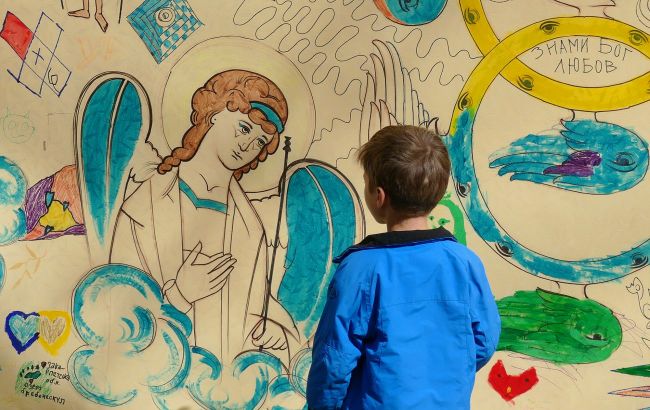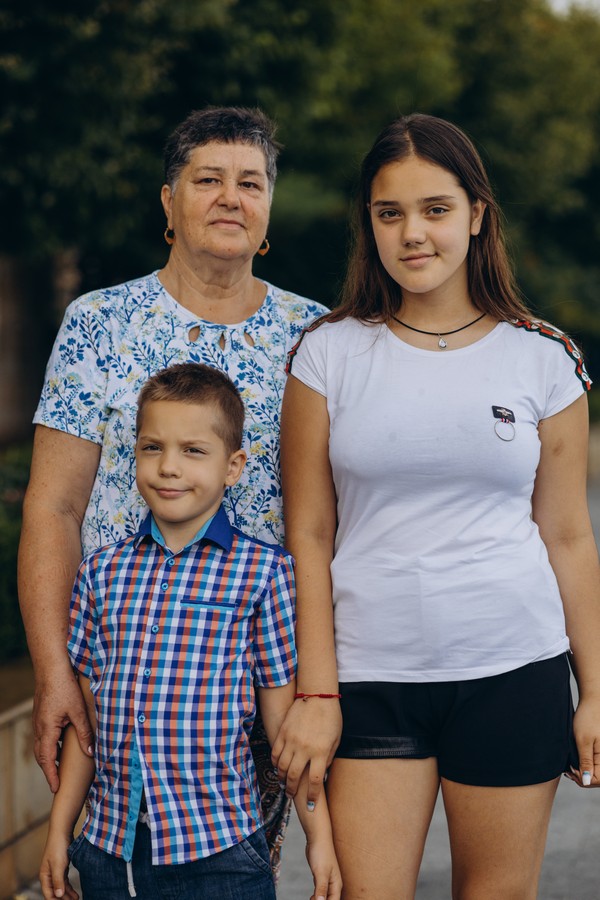'Mom, we were shot': Stories of children who endured occupation and loss of loved ones in the war
 What do children say about the war in Ukraine (illustrative photo: Getty Images)
What do children say about the war in Ukraine (illustrative photo: Getty Images)
A closed presentation of the exhibition "War Diaries: Unheard Voices of Ukrainian Children" took place in Kyiv, showcasing the stories of 14 teenagers who have experienced occupation, the loss of loved ones, or other traumatic events. They express their experiences through paintings and diaries and also receive support from mental health professionals.
RBC-Ukraine attended the event and spoke with these young heroes. The interviews were conducted with the consent of the children and their parents.
Artem, 12 years old
Artem's family lived in the Donetsk region in the town of Toretsk. When the full-scale invasion began, the family went to their country house in the village of Yatskivka. On March 11, Russian fighter jets began attacking the populated area.
One of the missiles hit the Skripchenko family's house.
"We were in the basement with the children at the time, and my husband was in the house. The house was completely destroyed, and my husband was trapped under the rubble. They rescued us, me and the children, from the basement, because everything around us started to explode and burn, and we were nearly suffocating," says Yana, the mother, about that day.
She tried to save her husband but couldn't. The couple's car caught fire. Yana remembers that her husband burned before her eyes.
She says that they had to evacuate in their pajamas with two children and were taken to Sviatohirsk, where they also hid in a basement. On March 12, the Russian military began shelling Sviato-Uspenska Sviatohirska Lavra from fighter jets.
 Drawings by Artem Skripchenko (Photo: RBC-Ukraine)
Drawings by Artem Skripchenko (Photo: RBC-Ukraine)
Yana's younger brother came and took her and the children to Ternopil. The family has been living in this city ever since. In Ternopil, both the children and Yana worked with psychologists to cope with the traumatic events. Despite a challenging past year, the family is adapting to their new surroundings and sharing their strength with others.
12-year-old Artem says it was important for him to share his story.
"Some children might read this and think about many things happening in their lives, appreciating their parents more and everything we have because it can all disappear or burn at any moment," the boy says.
His mother Yana is involved in volunteering and helps women who have lost their loved ones in the war.
"Of course, we want to go back to the happy life we used to have, but we will cope bit by bit. I am very inspired that I can help such families. I tell them that they need to keep on living, not give up. Sometimes they are surprised that I went through such an experience and still say to keep on living. We must hope for the best," Yana shares her experience.
Arina, 13 years old
Arina lives in Odesa and is in the eighth grade. In her free time, she practices pole dancing and paints pictures about the war.
"My first painting depicted how I was shot, right in the spot. On the second one, I showed the flooded hydroelectric power station and a building with rockets flying over it," the girl describes her works.
On February 24, Arina woke up to explosions. She and several other children were taken to the Kherson region to her grandparents. She recalls that they often had to hide in basements, not only because of shelling. The Russians would enter every yard, loot it, and kill domestic animals.

Arina with her grandmother and younger brother (Photo: khersonline.net)
Arina talks about the morning that filled her with wonder.
"One morning we were having breakfast, a neighbor came to us for milk. And she said to her grandmother: "Hide your girls, because three girls were raped in the neighboring village. About the same age as yours." Every time the Russians moved towards our village, my sister and I sat in the basement. It could be a day, an hour, it could always be different," the girl says.
Another case that shocked the child was the shooting of wounded Russian soldiers by their "brothers".
"The Russian armored personnel carrier was going to the paramedic. They took out the bodies of two wounded people from there. They say, do something to them. She (the doctor - Ed.) said that she didn't have anything yet, because the ambulance was shot. They take off the body armor of these wounded and shoot them, they take their weapons, get on an armored personnel carrier and drive away. Our soldiers from the village buried them somewhere," Arina shares.
Problems with products began in the village. Kherson was shelled more often. The child understood: every day can become the last. So she called her dad and asked him to take them from there.
When Arina's father was really able to come to the occupied village, the girl did not tire of joy.
"Grandpa went to open the gate. I see a car pull in. I quickly put on my slippers and ran out even without a jacket. When dad drove in, I put my hand on the hood and ran to the end like that. When he got out of the car, I hugged him so hard." - says Arina.
That day she was everywhere with her father.
The next day, they began the evacuation, passed many roadblocks and followed all the instructions of the occupiers. On the car was written "CHILDREN" in large letters. However, the invaders still opened fire.
"Dad quickly hit the brakes and yelled: 'Get on your feet.' At that moment there was such a whistle that there was a vacuum in the ears. Dad and my older brother screamed. I started screaming too. I thought they would hear that there were children and stop shooting. Stopped," says the girl.
Raising her head, she felt that military personnel were knocking on the door of the car. They ordered to run out and started shooting. At that moment, Arina grabbed the hand of her brother and sister to fall into the same trench together.
The occupiers approached the children, asked for information and gave them a bandage. The girl remembers that it was so dry that it crumbled in her hands, but she had to make a bandage with it.
She says that while the occupiers were holding them, dad was lying in the car.
"I began to kneel down and ask them to take my dad away. They still went there and shouted: 'Alive,'" Arina recalls.
After that, a car arrived, where the children got in and drove off in an unknown direction. Arina's father was put in the trunk. Another roadblock, already Ukrainian. The girl ran out and asked her dad to save her.
The victims immediately began to provide help and contact their mothers. On the phone, the children said that they had been shot. The family was taken to the hospital. Arina's well-being worsened sharply.
"I couldn't feel my legs. The doctor ran up to me, took me by the arms and led me to the ward. He was doing something, but I didn't feel anything. It was just very cold. I was x-rayed and taken to the first floor. I just lay and looked at the ceiling ", the girl recalls.
At that moment, her mother approached her and said that her father had died. After that, Arina started keeping a diary. On the front page, she wrote: "I'm clumsy. It's my fault that dad died."
This diary was received by the Minister of Foreign Affairs Dmytro Kuleba. He read excerpts of the notes at the meeting of the UN General Assembly in July. This is how Arina's story became known to the whole world.
Note: The text provided is a description of a project and its participants related to children's experiences during the conflict in Ukraine.
The initiator of the project "War Diaries: Unheard Voices of Ukrainian Children" is visionary Christina Khranovska. She has dedicated the last 15 years to social, educational, and cultural initiatives aimed at expanding opportunities for the younger generation.
"I began seeking support to make the voices of children heard worldwide," Christina shares about the idea of the exhibition.
Among the exhibits, there is also a large mailbox for letters so that visitors can write letters to the heroes of the exhibition.
"This is necessary for the children participating in the project to see that we're not just showcasing them but genuinely supporting them," the initiator says.
The exhibition "War Diaries: Unheard Voices of Ukrainian Children" was opened by the First Lady, Olena Zelenska. The speakers included teenagers who have encountered various aspects of mental health. They discussed abusive relationships, adolescent suicides, and self-realization.
The Head of the UN Children's Fund (UNICEF) in Ukraine, Murat Shahin, emphasizes that the topic of mental health is essential and should be open for discussion.
"Every day, we meet hundreds of thousands of children in our child centers. Psychological support for children and families throughout Ukraine is now more critical than ever. With this event, UNICEF, together with the All-Ukrainian Mental Health Program 'How Are You?' draws attention to the importance of openly discussing mental health and being able to support oneself, loved ones, and friends in the face of challenges and stress," Shahin says.
And thus, the most important message of the event was that seeking professional help is never a sign of weakness.
The project is implemented with the support of UNICEF, the "Children of Heroes" Foundation, the "Voices of Children" Foundation, the "Tu" platform, and the Ministry of Foreign Affairs of Ukraine. The main media partners are Suspilne News (Public News) and Suspilne Kultura (Public Culture.)

